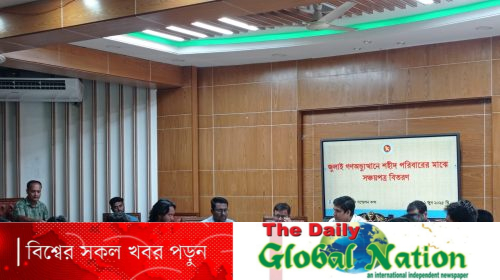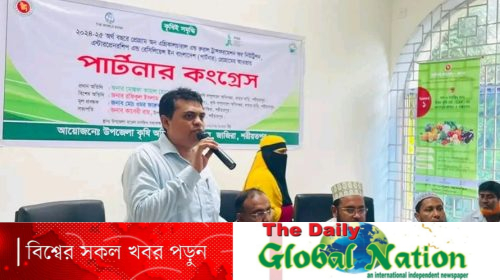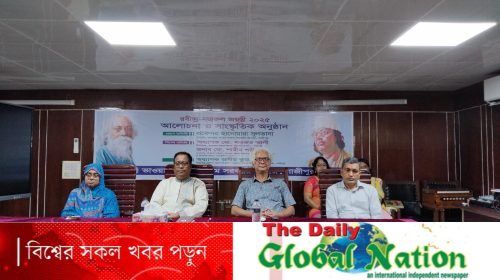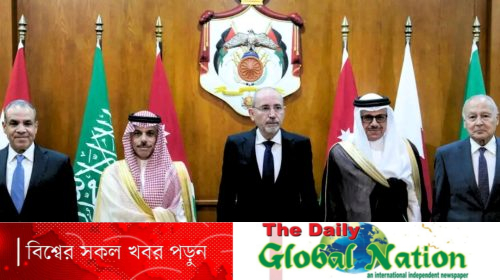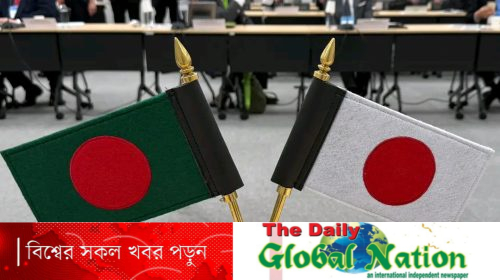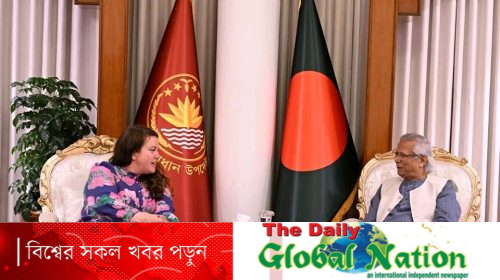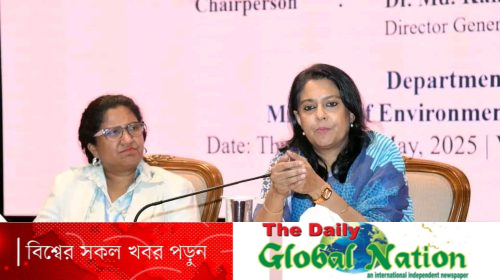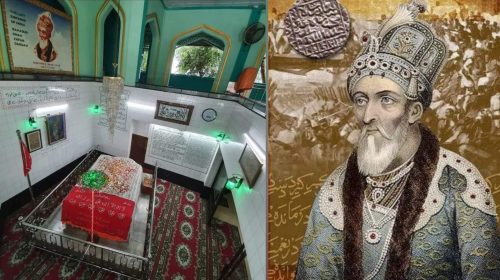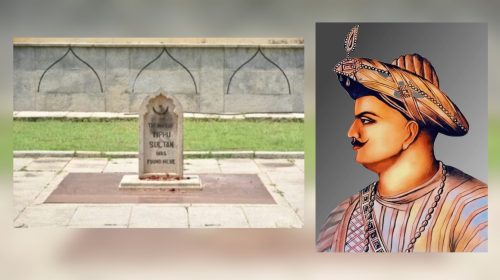
Tokyo, May 30, 2025: Bangladesh Chief Adviser Professor Muhammad Yunus and Japanese Prime Minister Shigeru Ishiba on Friday announced that the two nations will conclude an Economic Partnership Agreement in the coming months to deepen economic and trade relationships between the two friendly nations.
They made the commitment during an official bilateral meeting between two leaders at the office of the Japanese Prime Minister in Tokyo.
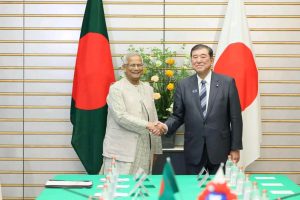
Their talks encompassed the entire gamut of the relationships between the two friendly countries, with both leaders reaffirming their abiding commitment to strategic partnership.
Japanese Prime Minister Ishiba described Bangladesh as a long-standing friend and stated that Japan would stand by Bangladesh in its endeavour for a democratic transition.
Shigeru Ishiba also paid tribute to Professor Yunus, saying Bangladesh will usher in a new era under his leadership.
He also highlighted Bangladesh’s importance for ensuring peace and stability in the Indo-Pacific region. “Bangladesh plays a critical role in regional stability ,” the Japanese Prime Minister said.
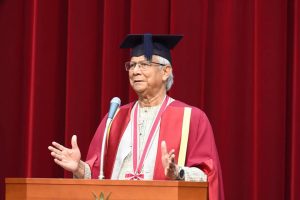
The Japanese Prime Minister said the two countries would conclude an Economic Partnership Agreement by the end of this year in an effort to boost trade and investment between the two nations.
Bangladesh Chief Adviser thanked Prime Minister Ishiba for Japan’s unwavering support of Bangladesh in the last ten months after the previous regime left a shattered economy, an empty coffer and destroyed institutions.
“We thank Japan for supporting the Interim Government and its reform initiatives. We seek Japan’s active support and cooperation in our endeavour,” he said.
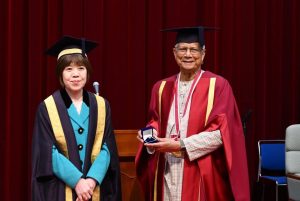
Professor Yunus reiterated Bangladesh’s firm commitment to a vision of a free, open and inclusive Indo-Pacific for the shared prosperity of all.
“Bangladesh is ready to forge partnership and cooperation with Japan to ensure maritime safety and security, freedom of navigation, sustainable use and management of marine resources, promote enhanced connectivity, and combat transnational organised crimes in the Indo-Pacific,” the Chief Adviser said.
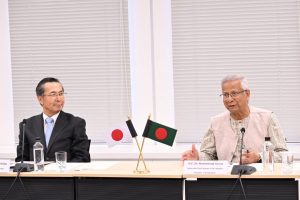
The Chief Adviser noted significant progress in the EPA negotiations and high-level visits in this regard recently.
“In pursuing our bilateral relations, we look forward to sustained engagements with Japan,” Professor Yunus said.
The Chief Adviser sought Japanese support for the construction of a land-based LNG terminal at Matarbari, an import-based LPG terminal at Moheshkhali and duty-free and quota-free access of Bangladeshi products to Japan for at least three years after the LDC graduation of Bangladesh in 2026.
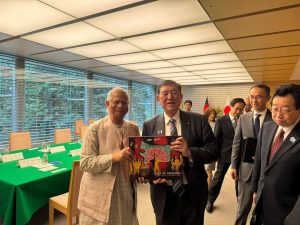
The Chief Adviser also sought a Japanese soft loan for the improvement of the Dhaka-Chattagram National Highway into a six-lane access-controlled expressway, the upgradation of the Chattagram-Cox’s Bazar highway and the construction of a new four-lane bridge over the Meghna-Gomti river.
He requested the Japanese Prime Minister to encourage Japanese manufacturers to invest in automobiles and electric vehicles, light machinery, high-tech electronics and the solar industry in Bangladesh and to connect its industrial value chain with Japan.
He urged Tokyo to launch the Bangladesh-Japan Skilled Workforce Partnership programme in an effort to meet Japanese labour shortages and pave the way for the recruitment of hundreds of thousands of Bangladeshi workers in Japan.
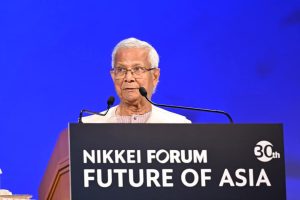
The Chief Adviser also asked Japan to increase the number of scholarships for the Bangladeshi students and for technical and vocational education training instructors to study in Japan.
The Japanese Prime Minister said Tokyo would provide assistance to Bangladesh to help overcome its challenges and the Interim Government’s efforts to create a prosperous and democratic New Bangladesh.
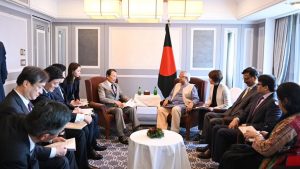
The two leaders also discussed geopolitical issues in the region, with Professor Yunus saying his government is committed to “the best relationships” with Dhaka’s neighbours.
The Chief Adviser called for redoubling Japanese efforts for a durable solution to the Rohingya crisis.
Prime Minister Ishiba recalled his visit to Bangladesh some 38 years ago when the Jamuna Multipurpose Bridge, built with Japanese assistance, was inaugurated.
He also praised the efforts of Professor Yunus and his pioneering micro-lender, Grameen Bank, to combat poverty across the globe.
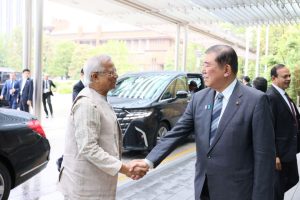
“Japanese people have profound respect for you,” Prime Minister Ishiba noted.
He expressed his willingness to visit Bangladesh at a mutually convenient time.
Japan to provide $1.063 billion for budget support, railways
( Update with signing of exchange of notes)
TOKYO, May 30: Japan and Bangladesh exchanged notes under which Tokyo will provide $1.063 billion to Dhaka as budget support, railway upgradation and grants.
Of the total, Japan will provide 418 million dollars as Development Policy Loan for Bangladesh’s economic reforms and climate resilience.
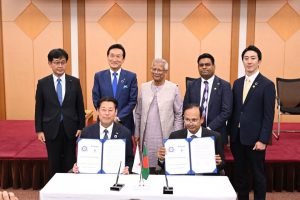
Tokyo will also lend 641 million dollars for upgradation of Joydevpur-Ishwardi into a dual-gauge double railway track and another 4.2 million dollars as grants for scholarships.
Three exchange of notes were signed later in the day, respectively on the Development Policy Loan for Economic Reform and Strengthening Climate Change Resilience(418 million USD), the Loan for the Joydebpur-Ishwardi dual-gauge double-lane railway project (641 million USD) and the grant for the human development scholarship (4.2 million USD).
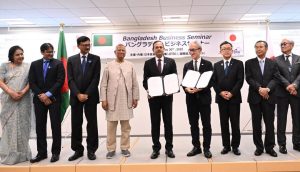
Bangladesh ambassador to Japan Md Daud Ali and Japanese ambassador to Bangladesh Shinichi Saida signed the agreement on behalf of the respective countries.
Chief Adviser Professor Muhammad Yunus witnessed the signing of the exchange of notes. End.
Chief Adviser seeks Japanese support to build New Bangladesh
Tokyo, May 30, 2025: Chief Adviser Professor Muhammad Yunus said on Friday sought the support of Japanese companies to build the New Bangladesh that he aimed for and urged them to invest more in the country.
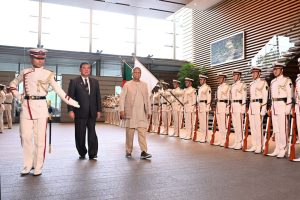
He made the call during a roundtable discussion in Tokyo on the third day of his ongoing visit to Japan, where some top executives of Japanese companies with significant business interests in Bangladesh.
“Wonderful to see you all; it is something that reassures us,” said the Chief Adviser.
“In the last 10 months we were building things piece by piece; that’s where Japan’s support was extremely helpful,” he said.
The Chief Adviser said that Bangladesh got a “sign of life” with the departure of the autocratic regime and sought a “ breathing space” to fix the mess.
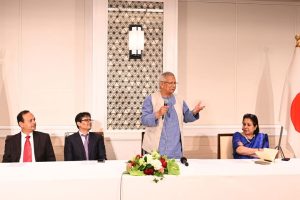
“Today we are in a situation when we need your support most. Our commitment is to create a new Bangladesh. We want to keep a distance from old Bangladesh,” he said.
The Chief Adviser said that the shortcomings that Bangladesh had now would soon be over.
“We hope that will be a matter of the past. This is the greatest opportunity the nation has. We have all had the terrible experience, and we want to keep it a thing of the past,” he said.
Norihiko Ishiguro, JETRO Chairman & CEO, in his opening remarks at the event, said Bangladesh has seen remarkable growth and investment opportunities in recent years.
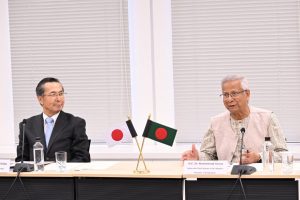
Fumiya Kokubu, Chairman of the Japan Bangladesh Committee for Commercial and Economic Cooperation (JBCCEC) and Director, Member of the Board, and Executive Corporate Advisor, Marubeni Corporation, said 85 per cent of Japanese companies having business in Bangladesh hope the Economic Partnership Agreement (EPA) would be signed this year. He also expected a reform in tax regulations.
Shinichi Saida, Ambassador of Japan in Bangladesh, said the most significant item that the Interim Government protected was the economy; no project was halted, and no businesses were suspended.
Shingo Ueno, CEO of Sumitomo Corporation; Mitsuru Izumo, CEO of Euglena Co., Ltd; Steven Winn, Chief Global Strategist of JERA; Kazunori Ogawa, Senior Managing Director of JBIC; Shigeyoshi Onoda, President of ONODA Inc.; Kazuya Nakajo, Executive Vice President of JETRO; and Mayumi Murayama, Executive Vice President of IDE-JETRO, spoke, among others, in the roundtable discussion.
Lutfey Siddiqi, Special Envoy of the Chief Adviser, delivered the concluding statement.
Bangladesh, Japan sign six MoUs
Tokyo, May 30, 2025: Japan and Bangladesh on Friday signed six Memorandum of Understandings on economic, investment and other cooperations on the third day of the ongoing visit of Chief Adviser Professor Muhammad Yunus to Japan on Friday.
Professor Yunus witnessed the signing of the MoUs on the sidelines of a seminar titled “Bangladesh Business Seminar” in Tokyo.
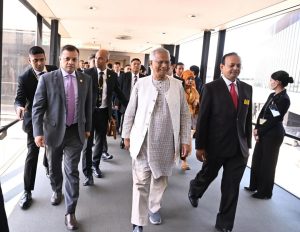
The first MoU involved the Japan Bank for International Cooperation and the energy and mineral resources ministry of Bangladesh.
The MoU is expected to strengthen cooperation between JBIC and Bangladesh to realise projects in the energy sector.
The second MoU was between ONODA Inc and Bangladesh SEZ Ltd for a land lease contract of BSEZ.
ONODA has implemented a gas meter installation project initiated by JICA and is planning to do new assembly manufacturing, inspection and maintenance of gas meters at the factory in BSEZ.
The third MoU involved Bangladesh Naxis Co. Ltd and Bangladesh SEZ Ltd for a land lease contract of BSEZ.
Bangladesh SEZ Ltd. (BSEZ) and Bangladesh Naxis Co. Ltd (Naxis) will sign a land sublease agreement. Naxis plans to manufacture apparel accessories at the factory in BSEZ.
The fourth MoU involved Glagit and Musashi Seimitsu Industry Glafit and the Bangladesh Investment Development Authority (BIDA) on support for setting up a factory for battery-run cycles and an electric motorcycle manufacturing plant.
The fifth MoU involves Cipher Core Co. Ltd, which is investing $20 million in its Bangladesh venture to launch a national pilot project for information security based on Complete Cipher Technology by award-winning inventor Takatoshi Nakamura.
The project aims to make Bangladesh a quantum-resilient digital economy, with exclusive rights granted to the local entity for technology deployment and global expansion.
The sixth MoU involves the Japan International Cooperation Agency and BIDA.
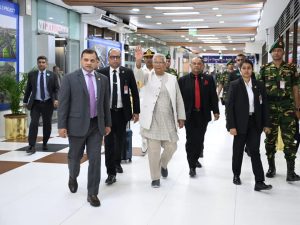
This MoU confirms JICA’s engagement to provide technical and in-kind support for the early-stage development of the Integrated Single Window Platform (ISWP).
This platform is a BIDA-led effort to consolidate the individual one-stop services currently operated by various investment promotion agencies across Bangladesh.
Speaking at the signing ceremony, Chief Adviser Professor Muhammad Yunus congratulated all parties involved.
“Now it is our task to implement. I am moved,” he said.
Mentioning the situation Bangladesh faced in the past 16 years, the Chief Adviser said that country faced continuous earthquakes in the past 16 years which left nothing in shape.
“In this situation a good friend came up… and that friend is Japan. I came here to thank you and design the next step,” he said.
Calling the challenge historical, the Chief Adviser said, “We want to show the history that it was done, done in a perfect way.”
“We have kind of tightened our belt and say here we are to work. With your support it is doable.
“Let’s put our hands together and execute it… it’s not about making money. It’s about changing people’s lives,” he said.
Shinji Takeuchi, Parliamentary Vice-Minister of Economy, Trade and Industry (METI), noted at the event that the number of Japanese companies operating in Bangladesh exceeds now 300, three-fourths higher than 10 years ago.
Norihiko Ishiguro, Chairman and CEO, Japan External Trade Organisation (JETRO), delivered the welcome speech where Fumiya Kokubu, Chairman of Japan Bangladesh Committee for Commercial and Economic Cooperation (JBCCEC) and Director, Member of the Board, Executive Corporate Advisor, Marubeni Corporation, also spoke.
Japan-Bangladesh Joint Press Release
Tokyo, 30 May 2025
1. H.E. Mr. ISHIBA Shigeru, Hon’ble Prime Minister of Japan met with H.E. Professor Muhammad Yunus, Hon’ble Chief Adviser of the Interim Government of the People’s Republic of Bangladesh in Tokyo during the latter’s official working visit to Japan on 30 May 2025.
2. Recalling the long-standing friendship since the independence of Bangladesh, both sides reaffirmed their commitments to the Strategic Partnership between the two countries. They also reiterated their shared vision for a Free and Open Indo-Pacific (FOIP) to ensure peace, stability and shared prosperity for all. Both sides held discussions on international and regional matters and reaffirmed their commitment to enhance cooperation for ensuring peace and stability in the region and beyond, upholding the principles of the United Nations Charter. Both sides also affirmed their support to multilateralism based on the rule of law, as well as to democracy.
3. Both sides held in-depth discussion on bilateral relations and issues of mutual interest in a candid manner. Prime Minister Ishiba reiterated Japan’s full support to the Interim Government of Bangladesh led by Professor Yunus for its nation-building efforts, its reform initiatives, and its endeavor towards a peaceful transition in Bangladesh. Professor Yunus expressed gratitude to the Government of Japan for its continued support to foster sustainable economic growth and development in Bangladesh in advancing Japan-Bangladesh bilateral relations, especially for the projects under the Bay of Bengal Industrial Growth Belt (BIG-B) Initiative, including Moheshkhali-Matarbari Integrated Infrastructure Development Initiative (MIDI).
4. In this regard, both sides welcomed the signing of the Exchange of Notes for the Development Policy Loan for Economic Reform and Strengthening Climate Change Resilience, and the Loan for the Project for the Construction of Dual Gauge Double Line Between Joydebpur-Ishurdi Section (I).
5. Both sides also welcomed the signing of MoUs and MoC including ones on One Stop Service (OSS) system in BIDA, installation of pre-paid gas meter, setting up factory for battery-run cycles, launching a pilot project for information security, and land agreements with the Bangladesh Special Economic Zone (BSEZ), to promote Japanese investment in Bangladesh. They underscored the importance of concluding the Economic Partnership Agreement (EPA) in mutually beneficial way and instructed their respective ministries and negotiating teams to accelerate negotiations to reach an agreement at the earliest possible time.
6. Both sides reiterated their commitment to further strengthening political and security cooperation, including early delivery of five patrol boats to Bangladesh Navy under Japan’s Official Security Assistance (OSA). They welcomed that the two Governments agreed in principle on the Agreement concerning the Transfer of Defense Equipment and Technology, and expressed their hope for early conclusion of the Agreement.
7. Both sides discussed ways to promote people-to-people exchanges, including skilled human resources, and concurred in strengthening cultural ties between the two countries. In this regard, Professor Yunus thanked Prime Minister Ishiba for Japan’s continued support for human resource development in Bangladesh, including the Project for Human Resource Development Scholarship.
8. Prime Minister Ishiba commended Bangladesh for temporarily sheltering the Forcibly Displaced Persons from Rakhine State, Myanmar, and extending continued humanitarian assistance to them. Professor Yunus appreciated Japan’s humanitarian assistance for these Forcibly Displaced Persons, including those in Bhasan Char. Japan reaffirmed its sustained efforts on this issue. Both sides shared the view that a sustainable, safe, voluntary, and dignified repatriation of the displaced persons to Myanmar is the ultimate solution to this crisis for peace and stability across the region. Both sides also recognized the importance of sincere dialogue among all relevant stakeholders to resolve the crisis.
9. Professor Muhammad Yunus expressed sincere appreciation to Prime Minister Ishiba and the people of Japan for the warm welcome and hospitality extended to him and his delegation, and invited Prime Minister Ishiba to visit Bangladesh at a mutually convenient time.
Chief Adviser urges JICA to bolster MIDI support
Tokyo, May 29, 2025 — Chief Adviser Professor Muhammad Yunus has called upon the Japan International Cooperation Agency (JICA) to bolster its support for the Moheshkhali-Matarbari Integrated Development Initiative (MIDI), aiming to transform the region into a pivotal engine for Bangladesh’s future economic growth.
The appeal was made during a meeting with JICA President Dr Tanaka Akihiko on the sidelines of the 30th Nikkei Forum: Future of Asia, held at the Imperial Hotel in Tokyo.
“The MIDI region represents the future of Bangladesh,” Professor Yunus stated. “With access to the Bay of Bengal, we are developing deep-sea ports, highways, and railway links to connect the MIDI region with Nepal, Bhutan, and other parts of South Asia.”
JICA initially proposed the development of a deep-sea port at Matarbari. The Interim Government, under Professor Yunus’s leadership, is now formulating a comprehensive master plan to transform the entire MIDI region into a hub for ports, logistics, fishing, energy, and power.
“Our vision includes building a megacity in the region,” Professor Yunus added, noting that airports are also being upgraded to accommodate increased travel demands.
Dr Tanaka reaffirmed JICA’s commitment to the MIDI development but emphasised the need for accelerated decision-making to expedite project implementation.
In response, Professor Yunus announced plans to appoint a senior official to oversee MIDI projects and coordinate efforts with JICA and other potential foreign investors.
The Chief Adviser also revealed plans to establish free trade zones within the MIDI area, inviting foreign investors to set up manufacturing plants aimed at export markets.
Furthermore, the government intends to create an exclusive fisheries zone in the region, enabling large fishing vessels to operate.
“We need to engage in deep-sea fishing,” Professor Yunus explained. “Currently, fishing vessels from neighbouring countries exploit these waters, while our trawlers are too small for deep-sea operations. By developing our capabilities, we can process the catch in the fisheries zone for both export and domestic consumption.”
Dr Tanaka remarked that this was possibly the first time he had heard a Bangladeshi leader discuss deep-sea fishing initiatives.
The two leaders also discussed Bangladesh’s reform agenda following the July uprisings, the country’s democratic transition, and the Interim Government’s anti-corruption efforts.
Professor Yunus confirmed that general elections are scheduled to be held between December and June, after which he plans to return to his previous work once an elected government assumes office.
Additionally, the Rohingya crisis was discussed, with the Chief Adviser seeking increased JICA support for humanitarian responses.
Dr Tanaka expressed JICA’s willingness to participate in international efforts addressing the Rohingya crisis.
Chief Adviser congratulates Mahathir ahead of 100th birthday
Tokyo, May 29, 2025: Chief Adviser Professor Muhammad Yunus on Thursday congratulated former Malaysian Prime Minister Mahathir Mohamad ahead of his birth centenary, which will be celebrated in July.
Mahathir, who will turn 100 on July 10, called on the Chief Adviser at Imperial Hotel in Tokyo on the sidelines of the Nikkei Forum Future of Asia to revisit the memories they shared during their decades-long friendship.
“I wish you a very happy 100th birthday in advance,” the Chief Adviser told Mahathir, who served as Malaysian Prime Minister for 24 years from 1981 to 2003 and again from 2018 to 2020.
They discussed issues of mutual interest during the 40-minute-long meeting, including Bangladesh’s desire to become a ASEAN member and Rohingya repatriation.
Bangladesh applied to become a sectoral dialogue partner of ASEAN several years ago with the aim of becoming a full member. Malaysia is the current chair of the Siuth East Asian grouping.
“We need Malaysia’s support to become an ASEAN member,” the Chief Adviser told Mahathir, who played a key role in establishing ASEAN as a powerful regional body during his time as the Malaysian Prime Minister.
The Chief Adviser said that Bangladesh was also thankful to Malaysia, as the country employed hundreds of thousands of Bangladeshi people in the country in various sectors.
“In every village of Bangladesh, people know about Malaysia because people travel to the country for employment,” he said.
Mahathir said many Bangladeshis also established businesses in Malaysia and were doing well as entrepreneurs.
Mahathir recalled how Malaysia thrived due to his Look East policy and asked Bangladesh to undertake similar policies.
The Chief Adviser said that Bangladesh was also trying to increase its trade and bilateral relations with Malaysia’s neighbouring country, Indonesia, which, unlike Malaysia, is not a household name in Bangladesh.
Professor Yunus also requested Mahathir to use his influence to resolve the Rohingya crisis.
He also invited the former Malaysian leader to visit Bangladesh.
Mahathir said he would accept the invitation only if he was allowed by his physicians, who had restricted his travel due to his health condition.
Japan to recruit one lakh Bangladeshi workers in five years
Tokyo, May 29, 2025: Japanese authorities and businesses on Thursday announced plans to recruit at least 100,000 workers from Bangladesh in the next five years to meet the country’s growing workers’ shortage.
Speaking at a seminar titled, “Bangladesh Seminar on Human Resources”, Chief Adviser Professor Muhammad Yunus said that the Interim Government of Bangladesh would do everything in its capacity to create the job opportunities for Bangladeshis in Japan.
“This is going to be the most exciting day for me, the most inspiring day. This will open the door for Bangladeshis to not only work but to know Japan,” said the Chief Adviser.
The Chief Adviser witnessed the signing of two Memorandum of Understanding – first between Bangladesh’s Bureau of Manpower Employment and Training (BMET) and Kaicom Dream Street (KDS), a Japan-Bangladesh joint venture, and second between Bangladesh’s BMET and Japan’s National Business Support Combined Cooperatives (a business federation with over 65 receiving companies operating in Japan) and JBBRA (Japan Bangla Bridge Recruiting Agency) at the event organised in Toshi Kaikan conference hall.
“This gathering is about opening the door,” said the Chief Adviser, noting that
Bangladesh is a country of 180 million people, and half of them are under 27.
“The government’s job is to open the door for them,” he said.
Mitsuru Matsushita, Representative Director of Supervising Organisation
Shizuoka Workplace Environment Improvement Cooperative said many Japanese companies are facing enquiries about Bangladeshis, and he believed this trend would continue.
“Bangladeshi talents hold great potential. It is our duty to nurture their talent,” he said.
Mikio Kesagayama, Chairman of NBCC, recalled that about 14 years ago, Professor Yunus came to Japan and was telling stories about helping women through microcredit.
He said that in the first three decades of their business, they strived for a quality workforce.
“Our Federation looks to Bangladesh for young and capable labour. They can contribute to the development of both Bangladesh and Japan,” he said.
“In the coming five years we are prepared to welcome more than 100,000 Bangladeshi workers,” he said.
Sharing the future plan on the recruitment of Bangladeshis in the Japanese industries, Miki Watanabe, President of Watami Group, said a school they established in Bangladesh trains 1500 students every year, and they are now planning to raise the number to 3000.
With technical education in Bangladesh, they can enter the job market in Japan, he said.
Hiroaki Yagi, Japan International Trainee & Skilled Worker Cooperation Organisation (JITCO) chairman, shared the potential and challenges for Bangladeshis in the Japanese labour market.
He said the number of language teachers in Bangladesh is still short.
Niki Hirobumi, State Minister of the Ministry of Health, Labour and Welfare (MHLW), Japan, said Japan is facing a declining population and thus will need the support of Bangladeshi workforce.
“This can be promising not only for Bangladesh but also for Japan,” he said.
In his welcome speech, Daud Ali, ambassador of Bangladesh to Japan, said by 2040, the Japanese labour shortage could reach 11 million, and Bangladesh could take this opportunity to send more skilled workers.

